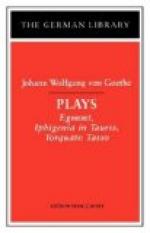Egmont. Young friend, whom by a strange fatality, at the same moment, I both win and lose, who dost feel for me, who dost suffer for me the agonies of death,—look on me; —thou wilt not lose me. If my life was a mirror in which thou didst love to contemplate thyself, so be also my death. Men are not together only when in each other’s presence;—the distant, the departed, also live for us. I shall live for thee, and for myself I have lived long enough. I have enjoyed each day; each day, I have performed, with prompt activity, the duties enjoined by my conscience. Now my life ends, as it might have ended, long, long, ago, on the sands of Gravelines. I shall cease to live; but I have lived. My friend, follow in my steps, lead a cheerful and a joyous life, and dread not the approach of death.
Ferdinand. Thou shouldst have saved thyself for us, thou couldst have saved thyself. Thou art the cause of thine own destruction. Often have I listened when able men discoursed concerning thee; foes and friends, they would dispute long as to thy worth; but on one point they were agreed, none ventured to deny, every one confessed, that thou wert treading a dangerous path. How often have I longed to warn thee! Hadst thou then no friends?
Egmont. I was warned.
Ferdinand. And when I found all these allegations, point for point, in the indictment, together with thy answers, containing much that might serve to palliate thy conduct, but no evidence weighty enough fully to exculpate thee—
Egmont. No more of this. Man imagines that he directs his life, that he governs his actions, when in fact his existence is irresistibly controlled by his destiny. Let us not dwell upon this subject; these reflections I can dismiss with ease—not so my apprehensions for these provinces; yet they too will be cared for. Could my blood flow for many, bring peace to my people, how freely should it flow! Alas! This may not be. Yet it ill becomes a man idly to speculate, when the power to act is no longer his. If thou canst restrain or guide the fatal power of thy father; do so. Alas, who can? —Farewell!
Ferdinand. I cannot leave thee.
Egmont. Let me urgently recommend my followers to thy care! I have worthy men in my service; let them not be dispersed, let them not become destitute! How fares it with Richard, my secretary?
Ferdinand. He is gone before thee. They have beheaded him, as thy accomplice in high treason.
Egmont. Poor soul!—Yet one word, and then farewell, I can no more. However powerfully the spirit may be stirred, nature at length irresistibly asserts her rights; and like a child, who, enveloped in a serpent’s folds, enjoys refreshing slumber, so the weary one lays himself down to rest before the gates of death, and sleeps soundly, as though a toilsome journey yet lay before him.—One word more,—I know a maiden; thou wilt not despise her because she was mine. Since I can recommend her to thy care, I shall die in peace. Thy soul is noble; in such a man, a woman is sure to find a protector. Lives my old Adolphus? Is he free?




